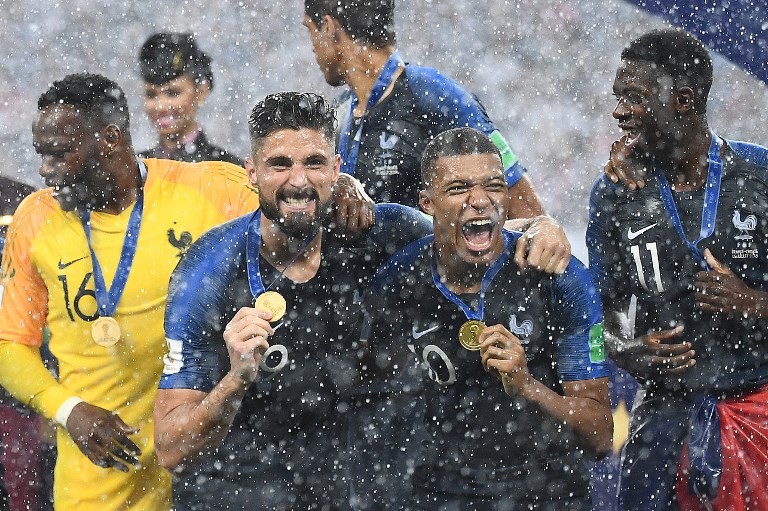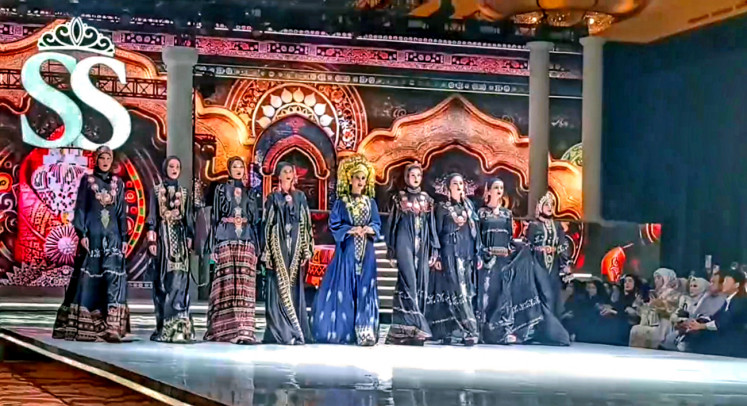What does France's World Cup win mean for immigrants?
France’s victory has thus placed immigration at center stage at a time of rising xenophobia on both sides of the Atlantic.
Change Size
 France's national soccer team (from left), goalkeeper Steve Mandanda, forward Olivier Giroud, forward Kylian Mbappe and forward Ousmane Dembele celebrate during the trophy ceremony at the end of the Russia 2018 World Cup final soccer match between France and Croatia at the Luzhniki Stadium in Moscow on July 15, 2018. (Agence France Presse/Franck Fife)
France's national soccer team (from left), goalkeeper Steve Mandanda, forward Olivier Giroud, forward Kylian Mbappe and forward Ousmane Dembele celebrate during the trophy ceremony at the end of the Russia 2018 World Cup final soccer match between France and Croatia at the Luzhniki Stadium in Moscow on July 15, 2018. (Agence France Presse/Franck Fife)
T
he final whistle blew at Luzhniki Stadium in Moscow, ending the electric six-goal FIFA World Cup final. France emerged victorious for the second time in history.
Apart from the own goal committed by Croatia’s Mario Mandžukić, all French goals made during the match were scored by players of migrant heritage: Antoine Griezmann (German-Portuguese), Paul Pogba (Guinean) and Kylian Mbappé (Cameroonian-Algerian).
The French team’s diverse roster is truly a testament of the immigrant communities’ colossal contribution to Europe’s place in the global soccer pantheon. More than 78 percent of the France squad come from migrant backgrounds, including the team’s captain Hugo Lloris who can trace his recent roots to Spain.
Moreover, 12 out of Les Bleus’s 23 players can trace their ancestry to Africa — primarily in corners of the continent previously colonized by France. They include names like Mbappé, the first teenager to score in a World Cup final since Pelé in 1958, and Samuel Umtiti, a Cameroon-born center-back who brought France to the final with his header in the match against Belgium.
France’s victory has thus put immigration at center stage at a time of rising xenophobia on both sides of the Atlantic. At home, Marine Le Pen, known for her opposition to globalization and calling for a moratorium on legal immigration, won a third of the votes in the run-off of last year’s presidential election.
Le Pen defeated candidates from two major political parties in France by politicizing the migrant crisis and arguing that French multiculturalism had failed. On the French soccer players, Le Pen suggested that most of them “consider themselves as belonging to another nation or having another nationality in their hearts”.
Indeed, the racial composition of the national team has been the subject of a persistent polemic in France. In 2005, philosopher Alain Finkielkraut declared that France’s “black-black-black” soccer team had become the butt of jokes in Europe. More recently, when the team’s World Cup roster was unveiled, French social media lit up with outrage because players of immigrant heritage squeezed out the “old-stock” French on the team.
Even when the French team was on the cusp of its second World Cup win, white supremacists in the fringes of Western Europe continued to deride the team as “African”. In the final, these people threw their support behind Croatia to symbolize their support for a “White Europe” – despite many in the Western Balkans backing Croatia as a way to associate themselves with pro-European Union openness and overcome the painful memory of war in the 1990s.
Now that these French sons of immigrants have proven to the public that they can bring glory to France, fans are united in celebrating and embracing their new heroes. Many are touting these players as poster children of France’s assimilation policy and models for young immigrants in the troubled banlieues (suburbs that have often been associated with urban violence and social unrest).
Around the world, France’s win has allowed people to take stock of the new reality of immigration and have meaningful conversations about race. In a rather commodifying manner, immigrants are celebrated because they get the job done and they bring benefits to the nations that welcome them.
However, had they come up short, these players would have faced intense backlash. Double standard persists; players of immigrant backgrounds tend to face harsher criticism than their teammates. This is reflected in a statement made by Mesut Özil upon quitting the Germany national team: “I am a German when we win, but an immigrant when we lose.”
The final outcome of this year’s World Cup is reminiscent of what happened 20 ago, when Zinedine Zidane, the son of Algerian immigrants, led France to the country’s first World Cup victory at Stade de France. Similar to the current squad, the 1998 French team was composed of the descendants of immigrants from former French colonies. Many players also grew up in the banlieues.
Following their victory, the team was hailed as “black, blanc, beur” (black, white and Arab), a play on the French tricolor flag: bleu-blanc-rouge. Soccer shortly became a means of promoting social inclusion and national solidarity, particularly with regards to the country’s ethnic minorities.
The perception of unity and celebration of diversity, however, was short-lived. Little progress transpired in the banlieus as complex structural problems continued to disadvantage immigrant communities.
Ultimately, a few months before the 2002 World Cup, Le Pen’s father and founder of the anti-immigrant Front National party, Jean-Marie, qualified for the second round of the French presidential election. While he was ultimately defeated by Jacques Chirac, Le Pen Sr., who ran a far-right campaign, successfully garnered more than 5.5 million votes in the run-off.
It was not until 2017 that the National Front would qualify again for the second round of the presidential election. Not unlike his daughter, Le Pen Sr. also hurled an incendiary comment targeted at the France national soccer team. He once described the players as foreigners who did not know how to sing the national anthem.
For the next few weeks or maybe months, exuberant French fans will temporarily forget the debate on immigration and race as the chants of Liberte, Égalité, Mbappé continue to reverberate across the country. How long they will last is a different matter.
Despite tales of immigrant achievements, this World Cup epoch will not easily resolve the rise of xenophobia and vitriolic anti-immigration political rhetoric in France and beyond. (kes)
***
Eki Ramadhan is a policy researcher based in Jakarta. He is a former Freeman Asian Scholar at Wesleyan University, where he studied political science and economics.









